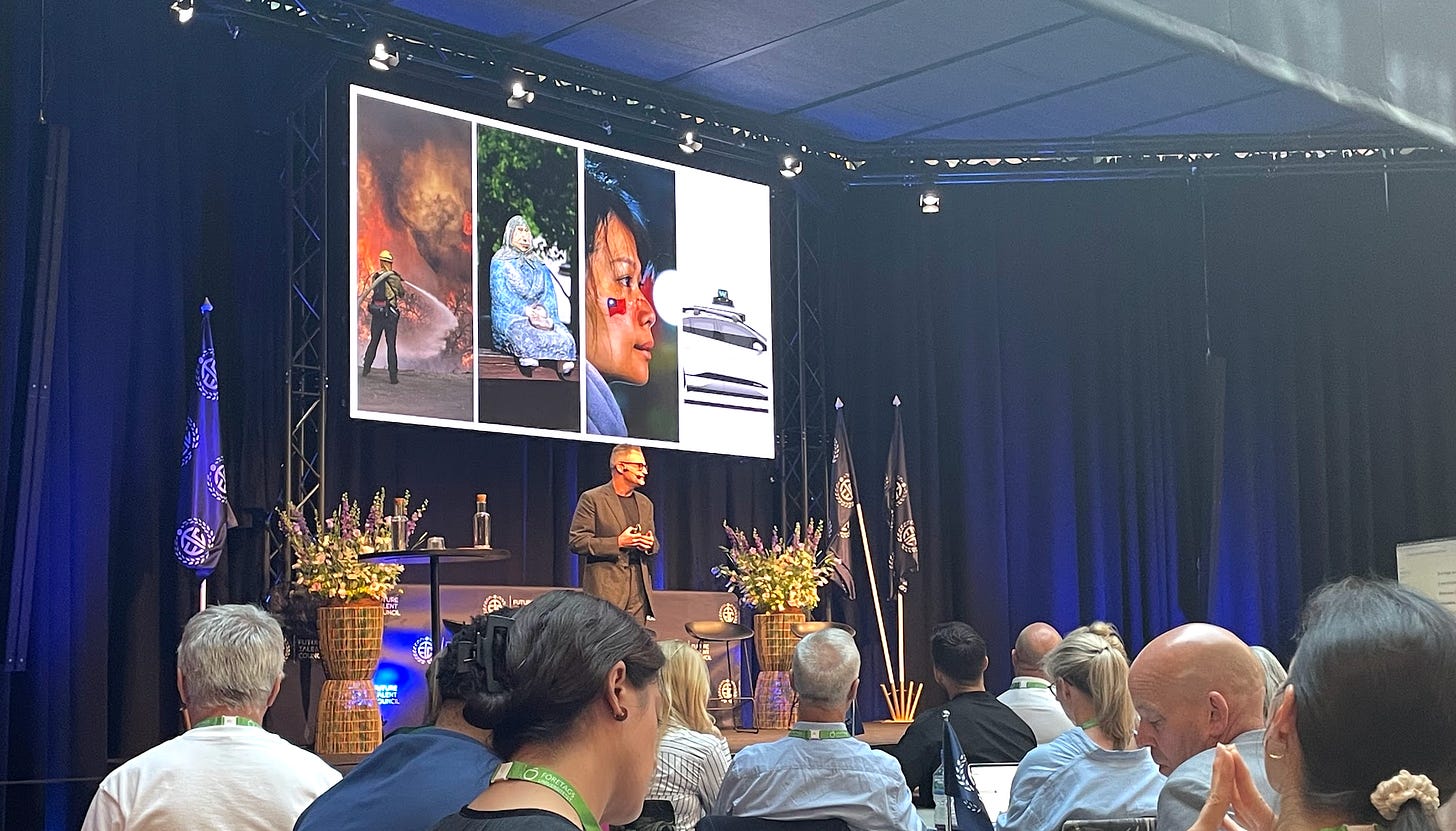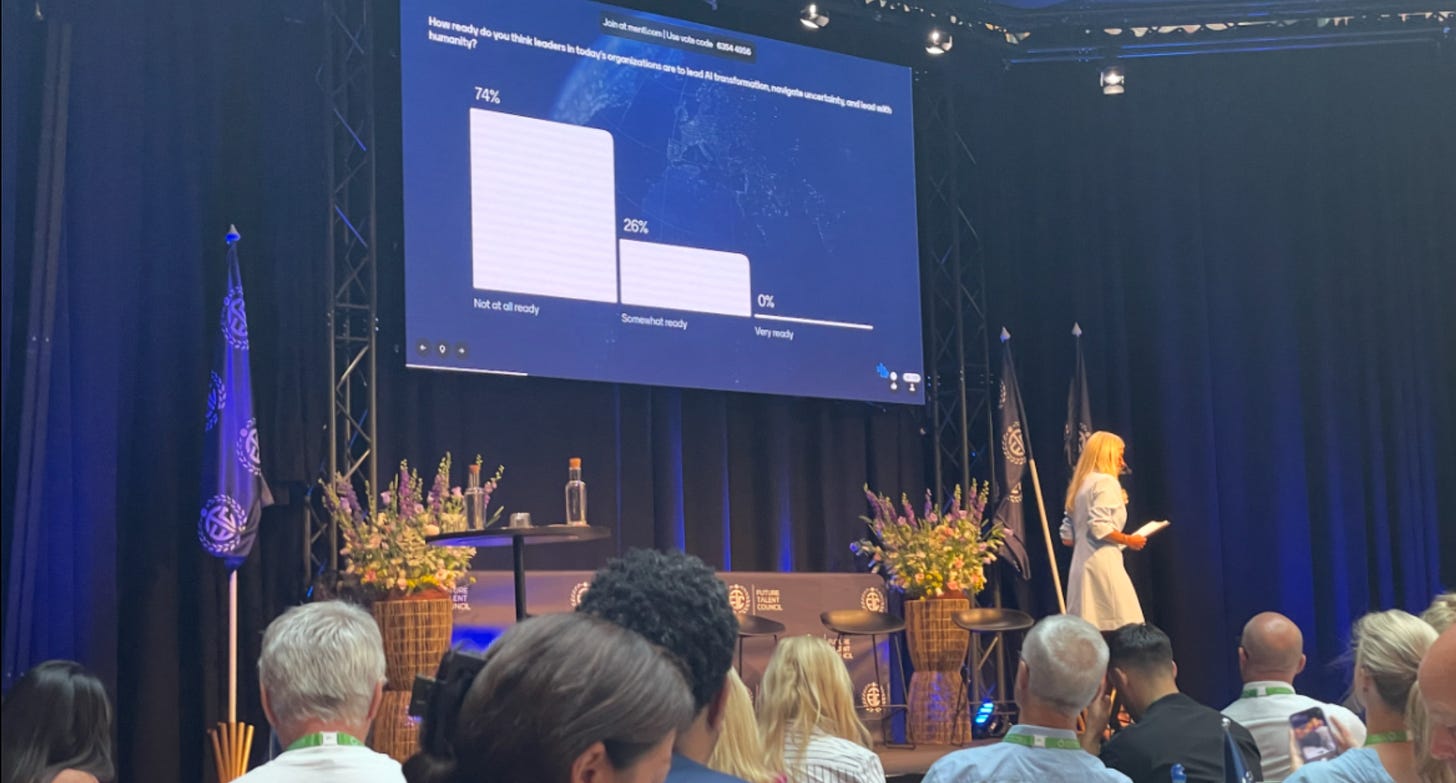Designing for the Human Edge
Why the future of work depends on staying deeply human in an AI-driven world
👋 Hej again! I’m back from Stockholm, but since this is a recap, I thought I’d remain in the spirit with a Swedish greeting!
I’m writing because education wasn't designed around students but we can improve the learner experience through design. I share stories, tips, and work in progress weekly.
Why it matters:
Last week I spent 2 days in Stockholm with 200 talent and education leaders, technologists, and policymakers at the Future Talent Summit to engage around the ways that AI is shaping our world and will affect our work. We’re in an important inflection point to reflect on what learning and work should look like, and I hope this insight can help shape your thinking.
Go deeper:
We heard from Google’s Chief Learning Officer, Brian Glaser, who introduced the 4 forces that Google uses to evaluate their strategy (along with some enlightening stats for each, a sampling of which I’ve included below):
The 4 forces informing Google’s strategy

Environment: Scientists estimate there could be 1 billion climate refugees by 2050
Geopolitics: Edelman Trust Barometer reported that 61% of employees believe that business leaders are purposely trying to mislead them
Technology: AI is projected to contribute $16 trillion to the global economy by 2030
Demographics: 10% of global population is over the age of 65, projected to be 18% by 2050
He described the changes that will shape our world related to these forces and how they influence decision-making in their organization.
Working with robots
More importantly, he described the ways that AI cut across these forces and is driving one of the lost significant shifts in our lifetime:
“Over the next five years, we're estimating that 30% of the hours worked today will be automated, and 70% of our jobs will fundamentally change.”
Brian introduced the concept of “co-intelligence,” (crediting Ethan Mollick), or bringing out the best of what humans and machines can do. As we design what the future of AI and humans look like, this notion is especially important. And worth mentioning, we’re still early in this journey:
“We know that people who use AI are generally 33% more productive every hour, but in our workforce globally only about 5% of people are using AI 5% of the time”
Google is running sprints internally to identify opportunities to automate where they can build fluency with AI while driving efficiency and creating space for human skills. But this dynamic is a delicate one as it’s tempting to give over tasks to AI to gain efficiency.
Later in the summit, Michael Gerlich introduced the concept and dangers of “cognitive offloading,” or giving over critical thinking to AI and the studied affects of degrading critical thinking through the “misuse” of AI:
“When you use AI for outputs, what is your contribution? If you don’t contribute to the process, you have replaced yourself.”
And no wonder the idea of offloading is alluring with the pace of change and the rapid evolution of skills. Uzair Qadeer, Chief People Officer at the BBC, shared that
“Today the half life of skills is 2.5 years and 40% of skills that you learned in a previous year become obsolete the next year”
Collaborating with leaders making AI plans on campus
In breakouts I spoke with Higher Ed Deans and Leaders participating in the Center for Higher Education Transformation working group were grappling with these dynamics in real-time and worked to coordinate strategies for how they move forward.
For institutions struggling to come up to speed they were exploring how to integrate AI into their curriculum, using AI to enhance their student experience and drive efficiency, and consider how they position as an AI-enabled institution in their knowledge production.
They saw the need for applied, relevant experiences to bring the application of these tools and the development of AI-durable skills for their students.
“Human” skills to succeed in an AI-enabled world
Naturally as the conversation reinforced the pace, scale, and impact that AI will have in our lives, speakers introduced what will be required of humans to adapt to the coming changes.
One thing was consistent: across the Summit, speakers described the importance of “human” skills as those required to thrive at work in an AI-enabled world, including:
Emotional and social intelligence
Radical self-awareness
Vulnerability
Ability to navigate tough conversations
Leadership and influence
Collaboration in diverse teams
Deep tolerance for uncertainty
Ethical judgment and integrity
Creativity and complex problem solving
Adaptability, agility, and flexibility
Continuous reinvention, constant experimentation
Resilience, determination, and grit
Curiosity by becoming “learn-it-alls”
Tolerance for failure
It’s heartening to know that the skills that will help humans succeed are the very characteristics that set us apart, though a little unsettling considering employer surveys might lead you to believe that there’s lots of room for improvement today.
But how do we cultivate the “human” skills?
What’s certainly true is we need to think differently about the types of experiences that we design to target the deliberate development of these skills for humans to be successful in an AI-driven world.
And I’d argue that while we also need to develop technology, data, and information literacy to collaborate with AI, the human skills outlined above are best cultivated in the middle of the messy world with a community, guide, and regular practice.

It’s time to act and the mission has never been clearer
And while this might all seem gloomy or overwhelming, I was encouraged by the tone that so many carried with them in reflections on the event, and in visions of the future from speakers themselves.
One quote from the experience shared by John Fischetti especially lingers with me:
“We get the leaders we choose, and we get the outcomes we choose”
The question ahead of us becomes clearer than ever if we’re ready to address it:
How do we cultivate human skills through real experiences, deliberate practice, and regular reflection and feedback through experiences that prepare learners to succeed in the future?
Insights from the Field
Bringing you voices from across education to answer:
What advice would you give to someone driving change in education?
“Most classrooms still drill kids to become dependable order‑takers, which stamps out their creativity and limits their potential. In a world of advancing technology and social polarization, we sit at an inflection point and must focus on mindsets of change-making and human-centeredness.
First is empathic collaboration: before building solutions, it's important to ground in purpose and solve real problems for people. Education shouldn't be the individual journey it is today: it should be about building for others, while learning to collaborate and build with others.
Next is insatiable curiosity: whether it's learning people's stories and needs, understanding how technology and tools work, or piecing together how the systems around us operate, asking “why?” builds deep understanding and enables you to wield your change-making powers with intention.
Lastly is fearless tinkering: build the courage to always try, make mistakes, tweak, and repeat. We are in an exciting moment of new-ness and a level playing field: those who jump in early, tinker, and grow will be the leaders of tomorrow.
When learning becomes about connecting with people and building things to improve our world, learners won’t just be equipped to navigate the future, they’ll shape it.”
Rajan Patel, Founder & Principal, 37c, Co-Founder and Former CEO, Dent Education
Learning is better when it’s social.
If this post moved something in you, tap the ❤️, pass it along, or join the conversation on LinkedIn—I’d love to hear what it sparked.




